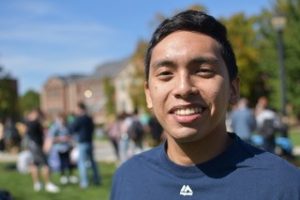An interview conducted by Jason O. Chang, director of the Asian and Asian American Studies Institute, with Ryan Verano ’18 (CLAS), a UConn economics major and Asian American studies minor, on his mission in the healthcare field.
 Chang: Hi, Ryan. It’s great to see you around campus since your graduation, thanks for coming by.
Chang: Hi, Ryan. It’s great to see you around campus since your graduation, thanks for coming by.
Verano: Oh, yeah no problem. I’m always checking in on my friends here and trying to catch a game of basketball with them.
Chang: That is a good reason for coming back to campus. Well, maybe we could start by talking about how you became interested in health care and what your goals are?
Verano: Sure, it all starts with my mom. My mom was a nurse so her influence on my interest in health care has been present from an early start. Health care offers the opportunity to learn more about the complexities of the human body as well as the chance to oversee the care of a human life. As I started to shadow and observe different medical specialties these past few years, I became enamored at the great responsibility that physicians have to the treatment of their patients. I have been fortunate to observe open heart surgery, lung cancer surgery, orthopedic surgery, read CT scans, and watch blood drawn via venipuncture. These are very diverse ways that physicians can impact the health of a patient. Nonetheless, they are critical elements depending on the particular condition. Yet, I kept asking how patients’ lives can be guided to avoid ever needing these life altering treatments like open heart surgery.
Being heavily involved as a leader in the Filipino community (FASA Co-President, UniPro, FIND) during my UConn years, I became aware of the diseases prevalent among Filipinos such as diabetes, high blood pressure, and hypertension. My desire is to become a M.D or a D.O. so I can continue being of service to the Filipino community, this time as an advocate for people’s health. Using my cultural competency, I want to help members of the community take charge of their health, and not fall victim to the diseases plaguing our population. I wish to be someone who helps combat this problem and helps reverse this trend of heart related illness in Filipinos. Additionally, I want to partake in medical missions to the Philippines as a physician, and maybe open up a heath clinic there someday. That would be my way of giving back to the Filipino people.
Chang: That’s such a great story, how this interest started with your mom and morphed into thinking about the social and political impacts that dictate community health. How has taking Asian American Studies courses helped you in understanding the medical needs of different communities?
Verano: Minoring in Asian American Studies has allowed me to become more aware of the intricacies and dynamics of health in minority communities as an interdisciplinary problem. I became more interested in the social, political, and psychological legacies of the development of the U.S. occupation for the Philippines which generated racial stereotypes and exclusions of Filipinos in American society. This reverberates in medical treatments for members of these populations. For example, one treatment for a patient of a particular condition may not be the same for another patient with the same condition. This can be due to respect for a patient’s cultural customs, religious beliefs, way of life, and historical trauma etc. The plan of treatment may be different for each community, and physicians have to be culturally sensitive to that. More importantly, Asian American Studies has helped me to understand the existence of health disparities in minority communities. Some of the negative health trends plaguing minority communities can be attributed to a lack of cultural competency. If physicians can be more understanding of their patients’ culture and ways of life, they will be more likely to identify and tackle the risk factors in that particular population. Studying the history and trends of different Asian communities within America will serve me well in treating minority communities in the United States as a doctor.
Chang: It’s so important to bring this type of social and political awareness to providing health care. What advise would you give to students today who are considering a profession in medicine and health care
Verano: Medicine and health care I believe is the most rewarding field you can go into. You have the chance to meaningfully impact the lives of people from a health perspective. However, don’t go into medicine for the wrong reasons (money, pressure from parents, Asian stereotypes). Find your very own unique passion for wanting to enter a lifelong profession of service. This will be your guiding answer for whenever somebody will casually ask you, “Why medicine?” and the important personal statement question of “Why do you want to become a doctor?” If you find yourself having trouble answering either of the previous questions, do some self reflection. Your coursework, extracurriculars, leadership positions, volunteering all serve a purpose. Do yourself a favor and minor in Asian American studies. They’re not just something you use to build up your resume. Everything that you do and are interested in relates back to your desire to enter medicine. If you’re able to find that early in your college career, let that serve as your guiding principle. If not, that’s okay as well. Keep searching for it and eventually it will come to you.
Chang: Ryan, thank you for taking the time to chat with me today. I’m looking forward to hearing about medical school. See you soon.